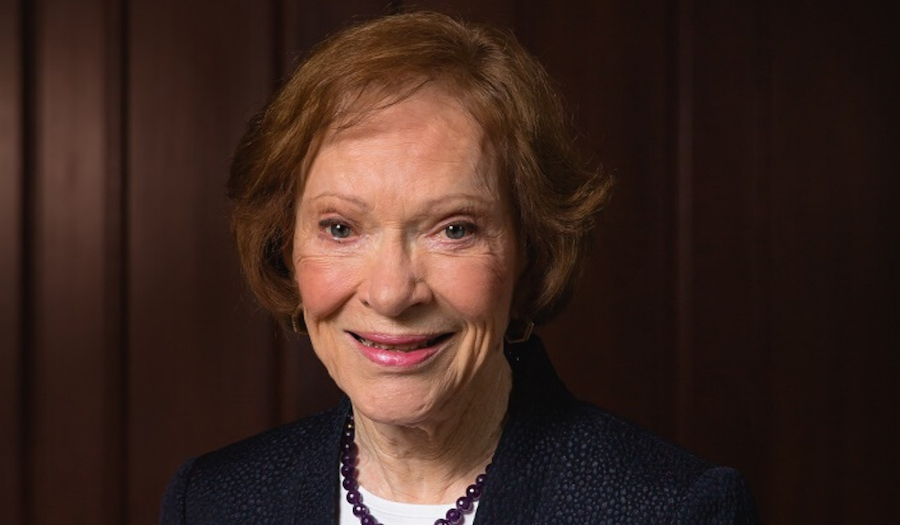Former First Lady Rosalynn Carter Shares Her Mission to Support America’s Caregivers

Former First Lady Rosalynn Carter knows first-hand about the vast responsibilities of caregiving. At the age of 12, her father was diagnosed with terminal leukemia and as the eldest daughter of four, she was tasked as his caregiver. In 1982, she founded the Rosalynn Carter Institute as a support system for the caregiving community. The nonprofit organization establishes local, state, national, and international partnerships committed to building quality, long-term, home, and community-based services.
1. You recently wrote an op-ed for the Des Moines Register suggesting that readers ask the 2020 candidates to put caregiving on their agenda. What is the most pressing issue facing caregivers today, and how do you hope our politicians will help?
Caregivers face a whole host of issues, ranging from the emotional and mental to the physical and financial, but if there is one issue that we emphasize, it is that caregivers need to be acknowledged. We know that there are more than 40 million Americans who take care of a loved one, be it a family member or friend, and some estimate that the number is much higher.
This group, which supports America’s most vulnerable patients in their homes instead of hospitals, is the largest health delivery system in our country—yet gaining recognition for their unique needs is an ongoing effort.
The first step is to shine a light on these selfless people, which was the purpose of the op-ed and the letters to the candidates. But what we really want to see is a national strategy directed from the White House and for caregivers to be a priority for Congress. There is no other group this large that doesn’t have that kind of attention.
2. You became a caregiver to your father at the age of 12. How did this experience affect you as you grew up and shape your future perspective?
It’s never easy to see someone you love become ill, but experiencing that at such a young age had a lifelong impact. My father went from being strong and active to tired and weak seemingly overnight. We all had to lend a hand to take care of him, and it took a toll on all of us.
We had family and friends who jumped in to help, which is one of the blessings of living in a little town like Plains. Yet even though we appreciated the assistance, it was a really isolating time because we didn’t want to show people the full gravity of the situation. That meant always putting on a “company face.” As I’ve met caregivers over the years, I’ve learned that my family’s experience was not unusual—that everyone in that situation wants to make things appear as normal as possible.
Because of that time, I truly understand how hard the job of caregiver is, and it motivates me every day to work to make their lives better. These people deserve our gratitude, our support, and—most important—our help.
3. Tell us a bit about the programs at the Rosalynn Carter Institute for Caregiving and how readers can become involved.
This is a very exciting time at RCI. We are growing and expanding the reach of the organization to additional communities of caregivers. We’ll always be tremendously proud of the work we have done in the areas of dementia and the military, and now we are taking what we have learned there to expand to help others. For instance, we recently launched a pilot program with the Georgia chapter of the ALS Association to extend our training to people who care for ALS patients. This is just the first of such programs we’re planning to help more and more groups.
We are also very focused on engaging more people in increasing awareness of the challenges caregivers face, which is a great place for your readers to get involved. Just as I urged the people of Iowa in my op-ed, I would encourage readers to ask their elected representatives what they are doing for caregivers. Ask their employers. Ask the companies that they do business with.
4. How can we show appreciation and support for the caregivers who are looking after our loved ones?
The best thing you can do for them is to be compassionate and supportive. Theirs is a very tough job and can be quite solitary, and many caregivers feel guilty if they consider their own needs. They often don’t realize that their well-being is critical to that of the loved one they are caring for.
If you want to help, offer to take some of the to-do’s off their list. Stepping in to take on caregiving tasks is often difficult, but you can pick up groceries and medications, mow the lawn, or bring over a home-cooked meal. Try to anticipate their needs rather than asking them to tell you what to do, which is just more emotional labor for them.
If you know someone who would benefit from a virtual support program, RCI hosts many of these, or you may even find assistance in your own backyard. The main thing is to check in with caregivers. It is our natural inclination to inquire about the loved one who needs care, and that is wonderful, but also be sure to ask about the caregiver. He or she needs care too.
This Q&A was featured in the November 3rd edition of The Sunday Paper. The Sunday Paper inspires hearts and minds to rise above the noise. To get The Sunday Paper delivered to your inbox each Sunday morning for free, click here to subscribe.
